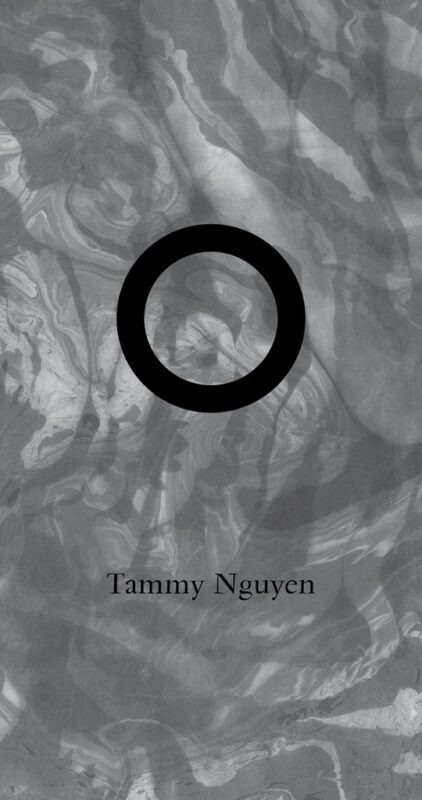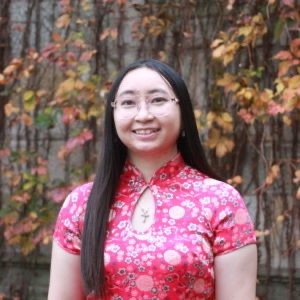
O by Tammy Nguyen is a multi-layered narrative that resists meaning. The stories that Nguyen tells of the dental procedures needed to achieve the perfect American smile, of the development of a man-made island called Forest City in Malaysia, and of Nguyen’s trek through the caves of the Phong Nha Karst, the Earth’s teeth, bleed into each other as the ink of the book’s cover art. Their confusing, poetic overlaps are visually represented by the holes punched on the outer edge of the book’s last few pages; sparse butterflies line the edges, and peer through the holes until one turns the page. O is an art book published in 2022 by Ugly Duckling Presse. It is a narrow book, with Nguyen’s stories interspersed with artistic black and white spreads of vegetation and figurative shadows; one spread even extends beyond the open book, featuring die-cut symbols.
Nguyen’s storytelling is circular, and open, achieved by her straightforward tone and simple literary language. O’s poetics come from symbolic scenes that hover from one story to the next, and back to another, through frequent section breaks and a narrative balanced with objective fact and reflection. One way that the stories echo back to each other is through the guide, a role filled by different characters who give Nguyen a window into local values, aspirations, some version of “truth”, and the processes by which those “truths” are achieved. Nguyen’s uncle David Van, with an eagle tattoo that pulsed with his faith in the American Dream, insists that she get her birth defect of missing front teeth treated; to have imperfect teeth, the Vietnamese American adults always warned her, was to look poor and uneducated. In another story, Nguyen and her tour group follow the sound of Dong, a guide from Quang Binh, who bellows “O-O-O-O-O-O-O-O” in the dark waters of the Phong Nha caves, until they locate sunlight. In New York, Nguyen asks an employee named Reno to give her a tour of Creodent’s facility, where false teeth are made, including her permanent implants. Here, Nguyen understands, a dental artisan will “sculpt my permanent crowns from zirconia, a ceramic material that is generally found in…riverbed deposits of wind-worked sand, much like the sand left behind by the millions of years of wind that carved away at Phong Nha.”
Nguyen focuses on the boundary between the natural and the man-made, critiquing the desires and processes to make the unnatural appear natural, and disturbed by moments when the natural appears unnatural. The entire orthodontist’s office staff rejoiced over how real her implants looked, her life saga of correcting her birth defect complete, $20,000 later. The Smiling Salesman spoke about reclaimed land technology with the same pride, celebrating that there was no climate change in the man-made island – and, Nguyen notes, no real plants and biodiversity either.
The “O-O-O-O-O-O-O-O” refrain is a powerful undercurrent of Nguyen’s stories, pulling memories of different times and places into the present. Hearing a porter at Phong Nha Karst calling “O-O-O-O-O-O-O-O”, Nguyen recalls Vietnamese country songs:
The lyrics of these songs often feature the same iconic elements: a bird, a fish, a river, a lover, a longing for a past time. Their melodies are melancholic, each long note slurring into the next with never a bright interval. They almost always end in a fadeout. Wherever I hear these songs – when I would watch Paris by Night with my parents and David Van, or today, in any Vietnamese coffee shop with a TV – I can feel the structure of the melody sculpt itself into the physical world. Each word ricochets off whatever surface it can find – a living room couch, a rock, a chair, a leaf – and molds its sadness to the shape of my surroundings.
“O-O-O-O-O-O-O-O” are not specific lyrics, but a melodic structure that “sculpts” and “molds” its sadness and melancholia in Nguyen’s stories. Yet O does feature one particular song, with specific lyrics – the Vietnamese national anthem. Molding itself to the political history of Vietnam, the anthem too becomes a sonic refrain, an “O-O-O-O-O-O-O-O” undercurrent of the diaspora. In an early part of the book, Nguyen describes the Little Saigon of her childhood in the Tenderloin of San Francisco, and the flag ceremony that initiated the Lunar New Year festivities, where she heard the anthem once a year:
Retired South Vietnamese Army veterans wearing green berets would stand in a line. A few women in ao dai, traditional Vietnamese dresses, stood in another. A few would hold South Vietnamese flags, a yellow banner with three horizontal red stripes representing the Northern, Central, and Southern regions of Vietnam. Others would hold the American flag. A very loud static recording of the anthem would start to play.
The same flag ceremony often precedes the public gatherings of Vietnamese Americans across the US. Nguyen recounts her personal understanding of the anthem’s history: her childhood dentist’s father, the Vietnamese American refugee Dr. Nguyen, had a hand in writing its first version, “Call to the Youths,” with Mai Van Bo and Luu Huu Phuoc, as part of the anti-colonialist youth movement in South Vietnam. The melody and structure was modeled after the French national anthem.
The flag ceremony echoes O’s other stories as its own unnatural and naturalizing process for the Vietnamese immigrant community. The static recording of the anthem prompts questions about intergenerational connection, and the need to instill and preserve cultural identity. Is this process natural? Where does this desire to implant, instill, preserve come from? How might it be unnatural, and how can one question it? Just pages before this scene, Nguyen dramatizes the coexistence of the young and old that she witnessed inside the Phong Nha caves: “Buried in the cave walls were organisms millions of years old, and here before our eyes was a whirling twister of youth. Bats, after all, live no more than twenty years, and many of those butterflies finished metamorphosis yesterday.” Is this image of nature as unsettling as elders guiding the youth toward preserving approximations of a memory, a truth, of the South Vietnamese past?
There are two treatment plans for congenitally missing lateral incisors, Nguyen tells us of her condition – either push the teeth apart to make space for prosthetic incisors, or push the teeth closer together and close the gaps in between. O is a narrative that experiments with the space “in between” to arrive at local truths. Through theme and form, Nguyen brings the symbols of her various stories close together and far apart, and offers a meditative read for the Vietnamese diaspora.

Cathy Duong is a current Masters student at UW Seattle Genetic Counseling program. In her free time, she enjoys traveling to Little Saigons, playing V-pop on her ukulele, and analyzing diasporic Viet literature.


